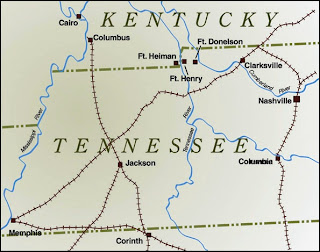"No terms except unconditional and immediate surrender can be accepted.”
A cursory glance at the map will show the importance of rivers for any Union force invading Tennessee in 1862. The road and rail network was limited and supply lines would necessarily lengthen with any forward advance. The Federals rapidly constructed a fleet of gunboats and transports, but the Rebels just as quickly fortified key positions along the Mississippi River. The Tennessee and Cumberland rivers could also provide protected arteries for invasion into the Deep South, so the Southerners began construction of Fort Henry and Fort Donelson to block those routes.
On February 6, 1862 a force of Union gunboats began a furious shelling of Fort Henry on the Tennessee. The Rebels fought gamely, but the fort was poorly situated. CSA Col. Heiman withdrew his brigades before U. S Grant could bring his ground forces into the fight.
Fort Donelson on the Cumberland proved to be a more difficult objective. Once again, On February 14, the Federals brought up their gunboats, hoping to batter the fort into submission. This time, after closing to within 350 yards of the fort, the gunboats were driven away and with loss. Unaccountably, CSA Brig. General Floyd with some 18,000 troops remained passive in the fort while Grant brought up his 15,000 (later reinforced to over 20,000) men and invested the fort.
Recognizing their error, the Confederates decided to fight their way out. The next morning, the rebel attack was initially successful and the way out was open, but the Southern generals did not take advantage of the opportunity provided by their hard fighting soldiers. Federal resistance was stubborn, notably by the 31st Illinois under John “Black Jack” Logan. A counter attack spear-headed by the Zouave brigade of Brig. General Lew Wallace (author of Ben-Hur, a Tale of the Christ) sealed the escape route.
Seeing the way blocked, Generals Floyd and Pillow decided to escape on two steamers which they loaded with troops. The rest of the Confederates were to surrender. The facts the 2 highest ranking CSA officers would abandon their comrades, and that nearly all of the escaping troops were Virginians did not sit well with the other Southerners. Nathan Bedford Forrest refused to surrender, so he led his command through an icy backwater and escaped.
When asked by CSA Brig. General Simon Buckner for surrender terms, U. S. Grant replied, "No terms except unconditional and immediate surrender can be accepted.” When news of the surrender of 12,000 Rebels reached the North, “Unconditional Surrender” Grant became the hero of the land. The South was open to invasion along the Tennessee and Cumberland rivers. The Confederates were flanked out of Strongholds at Bowling Green, Nashville, and Columbus. Western Tennessee was under Union control.
Unfortunately, and heart-breaking, many of the Confederate prisoners were sent to the notorious prison at Camp Douglas in Chicago. Camp Douglas was one of the worst prisons, period.
GOOBER PEAS
According to Wikipedia ~"Goober Peas" is a folk song mostly known in the Southern United States. It was very popular with the Confederate soldiers during the Civil War, and is still sung frequently in the South to this day.
The words of "Goober Peas" are a pretty accurate description of daily life during the last few years of the Civil War for the Southerners. After being cut off from the rail lines and their farm land, they had little to eat aside from boiled peanuts (or "goober peas") which often served as an emergency ration.
I remember singing this song in elementary school ~ Loree
Sitting by the roadside on a summer's day
Chatting with my mess-mates, passing time away
Lying in the shadows underneath the trees
Goodness, how delicious, eating goober peas.
Chorus
Peas, peas, peas, peas
Eating goober peas
Goodness, how delicious,
Eating goober peas.
Verse 2
When a horse-man passes, the soldiers have a rule
To cry out their loudest, “Mister, here’s your mule!"
But another custom, enchanting-er than these
Is wearing out your grinders, eating goober peas.
Chorus
Verse 3
Just before the battle, the General hears a row
He says "The Yanks are coming, I hear their rifles now."
He turns around in wonder, and what d'ya think he sees?
The Tennessee Militia, eating goober peas.
Chorus
Verse 4
I think my song has lasted almost long enough.
The subject's interesting, but the rhymes are mighty tough.
I wish the war was over, so free from rags and fleas
We'd kiss our wives and sweethearts, and gobble goober peas.
Chorus
.jpg) |
| Tennessee Sunrise near Columbia, Tennessee Photo by Loree Huebner |
Loree Huebner
Writing with one foot in the past...
On Twitter @LoreeHuebner
On Instagram @lunapickles
Writing with one foot in the past...
On Twitter @LoreeHuebner
On Instagram @lunapickles
www.facebook.com/LoreeHuebnerAuthor






